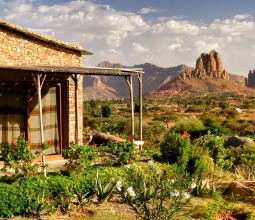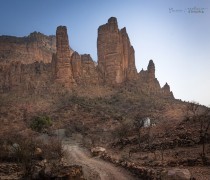A Great Lodge In The Northern Region
Korkor Lodge, Tigrey
Korkor Lodge, Tigrey Offers:
Lodging Type: Lodge
Dining: Ethiopian, Italian, Set menu
Facilities: Internet - Wifi, Laundry, Library, Showers - 24hr hot water
Activities:
- Rock-hewn churches
- Bird watching
- Trekking
- Mountain climbing
- Religious sites
- Geographical sites
Price range:
50-149 USD
About Korkor Lodge, Tigrey
This Italian owned lodge faces one of Tigrey’s most spectacular rock formations, bestowing on guests the changing colours of this view throughout the day.
The 8 en-suite cottages are glass-fronted to maximise the stunning view, and can be single, double, family or twin as required. With cream walls, wicker furniture, local fabrics and bathrooms with modern facilities, the cottages fuse the contemporary with the traditional. The landscaped gardens are filled with local plants and fruit trees. The lodge is eco-friendly, and runs off solar power and wind turbines, grows its own vegetables and fruits, and has its own borehole with plentiful water. Stone paths run between the cottages, and vines wind over the bamboo shelters giving the verandas plentiful shade.
The restaurant serves a set menu of Ethiopian and Italian dishes, created from pasta, rice, oil and more imported from Italy and fresh fruits and vegetables from its kitchen garden. The main building houses a reception, library, bar, restaurant and an outdoor seating area for breakfast and lunch if weather conditions permit.
Activities include visiting the many spectacular rock churches in the area. There are about 140 churches and archaeological sites in Tigrey, many of which are carved into the rocks and cliffs. The sites are dated to between the 7th and 14th centuries; some involve a gentle walk, and others require clambering up a rock face.
Reservations & Enquiries
To find out more, or request a quotation, add Korkor Lodge, Tigrey, to your list of favourites.
Accommodation In The Northern Area
- Abay Minch Lodge, Bahir Dar
- AG Hotel, Gondar
- AnKober Palace Lodge
- Armah International Hotel, Axum
- Atranos Fantasy Hotel
- Avanti Blue Nile Hotel, Bahir Dar
- Ben Abeba Lodge
- Cliff Edge Hotel, Lalibela
- Consolar International Hotel, Axum
- Degosach Mountain Eco-Lodge
- Delano Hotel, Bahir Dar
- Florida International Hotel, Gondar
- Gheralta Lodge, Tigrey
- Goha Hotel, Gondar
- Gondar Hills Resort
- Haile Resort Gondar
- Hotel Maribela, Lalibela
- Hudad Eco-Lodge, Lalibela
- Jacaranda Hotel, Bahir Dar
- Korkor Lodge, Tigrey (current)
- Kuriftu Resort, Bahir Dar
- Lal Hotel and Spa, Lalibela
- Lalibela Apartments
- Lalibela Hotel, Lalibela
- Lalibela Lodge, Lalibela
- Limalimo Lodge, Simien Mountains
- Mayleko Lodge, Gondar
- Mezena Lodge, Lalibela
- Mountain View Lodge, Lalibela
- Mulu Eco Lodge, Mt Choke
- Old Abyssinia Lodge, Lalibela
- Panoramic View Hotel, Lalibela
- Red Rock Lalibela Hotel, Lalibela
- Roha Hotel, Lalibela
- Sabean International Hotel, Axum
- Simien Lodge, Simien Mountains
- Sona Hotel, Debark
- Sora Lodge, Lalibela
- Taye Belay Hotel, Gondar
- Tim and Kim Lodge, Gorgora
- Top Twelve Hotel, Lalibela
- Tukul Village, Lalibela
- Wukro Lodge, Tigrey
- Yared Zema International Hotel, Axum
- Yeha Hotel, Axum
- Zagwe Hotel, Lalibela
- Zobel Resort, Gondar

